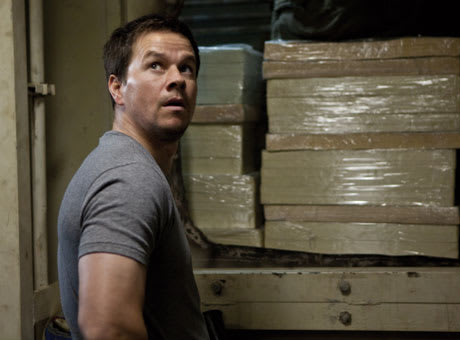In the 2008 Icelandic film Reykjavik ― Rotterdam, on which Contraband is based, a man (played by the director of this film, Baltasar Kormákur) decides to get back into the smuggling game after suffering a financial drought during the country's notorious economic crisis. Beyond the catalyst, wherein his nephew winds up owing a crap load of money to a crime lord after dropping a shipment of narcotics in the mid-Atlantic to avoid incarceration, the focus is that of mirroring underground criminal enterprises with corporate ones. The implication is that legal, self-serving, white-collar crimes ultimately affect more people than a self-serving contraband run.
This American remake, helmed by an acclaimed Icelandic filmmaker known for shocking dark humour, is set in New Orleans, making the actual smuggling of counterfeit funds from Panama more of a comment on the corruption in a devastated state rather than one of economy. Similarly, our ex-convict protagonist, Chris Farraday (Mark Wahlberg), is focused entirely on saving his nephew (Caleb Landry Jones), wife (Kate Beckinsdale) and two sons from the unpredictable wrath of resident bad guy Tim Briggs (Giovanni Ribisi). His financial woes are secondary, as are any extraneous dramatic efforts to connect him with his family beyond frantic cellphone calls.
This leaves the complex plot to propel the film, which fortunately has an exceptionally nasty bit of dark humour to help the usual crime genre shenanigans of compounding problems and mishaps during an increasingly convoluted heist or organized criminal act. And since the many hiccups are oddly plausible within the film's vacuum of implausibility, there's a sense of identification and comic mayhem about things like Chris being finagled into an armed car heist of Jackson Pollock paintings in Panama with crazed, machinegun-wielding criminals.
Some of this tonality may prove problematic to more sensitive viewers, such as a scene where sarcastic comments are made after Briggs throws Kate (Beckinsdale) across a room, threatens to rape her and then acts annoyed by the sound of gunfire more so than the fact that it almost went through the head of a small child. While it's consistent with the works of Kormákur, whose comedy of human vitriol, The Sea, easily trumps these mild moral deviations, there may be some audience discomfort with the light handling of unexpected acts of violence, often against Beckinsdale.
Understanding that there is no moral centre to this little bit of popcorn mayhem, it actually proves to be quite an entertaining and propulsive dark comedy. Of course, the characterizations are archetypal (retired criminal forced back into the game), as are the inevitable twists (why is Ben Foster in this movie?), but the tone and clever plotting manage to compensate.
(Universal)This American remake, helmed by an acclaimed Icelandic filmmaker known for shocking dark humour, is set in New Orleans, making the actual smuggling of counterfeit funds from Panama more of a comment on the corruption in a devastated state rather than one of economy. Similarly, our ex-convict protagonist, Chris Farraday (Mark Wahlberg), is focused entirely on saving his nephew (Caleb Landry Jones), wife (Kate Beckinsdale) and two sons from the unpredictable wrath of resident bad guy Tim Briggs (Giovanni Ribisi). His financial woes are secondary, as are any extraneous dramatic efforts to connect him with his family beyond frantic cellphone calls.
This leaves the complex plot to propel the film, which fortunately has an exceptionally nasty bit of dark humour to help the usual crime genre shenanigans of compounding problems and mishaps during an increasingly convoluted heist or organized criminal act. And since the many hiccups are oddly plausible within the film's vacuum of implausibility, there's a sense of identification and comic mayhem about things like Chris being finagled into an armed car heist of Jackson Pollock paintings in Panama with crazed, machinegun-wielding criminals.
Some of this tonality may prove problematic to more sensitive viewers, such as a scene where sarcastic comments are made after Briggs throws Kate (Beckinsdale) across a room, threatens to rape her and then acts annoyed by the sound of gunfire more so than the fact that it almost went through the head of a small child. While it's consistent with the works of Kormákur, whose comedy of human vitriol, The Sea, easily trumps these mild moral deviations, there may be some audience discomfort with the light handling of unexpected acts of violence, often against Beckinsdale.
Understanding that there is no moral centre to this little bit of popcorn mayhem, it actually proves to be quite an entertaining and propulsive dark comedy. Of course, the characterizations are archetypal (retired criminal forced back into the game), as are the inevitable twists (why is Ben Foster in this movie?), but the tone and clever plotting manage to compensate.




